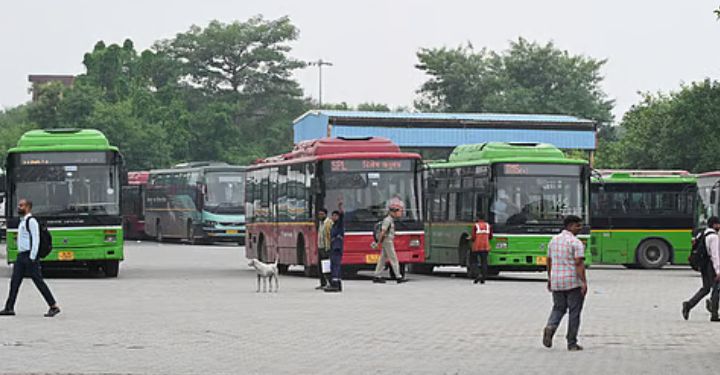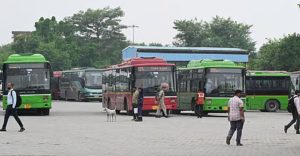Smart Cards, Smarter Commutes: Delhi’s New Travel Pass Empowers Women and Transgender Citizens

In a move that blends social equity with digital transformation, the Delhi Transport Corporation (DTC) has announced the launch of pink smart cards offering free bus travel to women and transgender passengers in the national capital. The initiative, timed with the festive occasion of Bhai Dooj 2025, aims to replace the existing “pink ticket” system with a more secure, efficient, and data-driven alternative.
The new system—called the Saheli Smart Card—marks a significant upgrade to the women’s travel subsidy introduced in 2019, and it is set to change how thousands of commuters navigate Delhi’s public transport every day.
Background: From Pink Tickets to Smart Cards
When Delhi launched its free bus ride scheme for women in 2019, it was hailed as a progressive policy for gender equity. However, the system relied on paper-based pink tickets issued manually by conductors. While popular, the system faced operational and financial drawbacks, including lack of transparency, poor tracking, and potential misuse.
The new smart card system seeks to resolve these issues by offering each eligible user a personalised travel card linked with KYC and integrated into Delhi’s broader transit ecosystem.
What is the Saheli Smart Card?
The Saheli Smart Card is a pink-coloured, contactless travel card:
- Eligibility: Women and transgender individuals who are Delhi residents, aged 12 years and above
- Verification: Mandatory KYC, requiring documents like Aadhaar, proof of residence, and a passport-size photo
- Usage: Enables free travel on all DTC and Cluster buses
- Technology: Complies with the National Common Mobility Card (NCMC) standard, allowing multi-modal integration (e.g., metro, though not for free)
Once issued and activated, users can tap the card on Automatic Fare Collection (AFC) machines inside buses to ride free—without the need for a physical ticket.
How to Apply for the Card
As per DTC’s rollout plan:
- Online Registration: Begins mid-October 2025 via the official DTC portal or app
- KYC Process: Conducted through select partner banks (e.g., SBI, PNB), which will issue the card after verifying documents
- Card Delivery: Dispatched to the applicant’s address via post
- Activation: Requires a one-time tap on DTC’s fare system to enable usage
Applicants must ensure that all documents match current Delhi address and identity details. The government has also set up help desks and mobile registration units to assist less tech-savvy users.
Transition Plan: Pink Tickets Will Continue Temporarily
To avoid disruptions, DTC has announced that the existing pink ticket system will remain in place during the transition period. Commuters can choose either the old method or the new smart card until full switchover is achieved.
Officials estimate that over 20 lakh women and transgender people currently use the free ride scheme daily—and the smart card system is expected to cover this entire group within 6 to 8 months of rollout.
Key Benefits of the Smart Card System
Transparency & Accountability: Digital tap-ins allow real-time tracking of ridership and subsidies, reducing misuse
Ease of Use: Eliminates need to request paper tickets for every ride
Scalability: Can be expanded to more transit modes and services over time
Security: Personalized card with photo and name helps prevent unauthorised use
Inclusion: Recognises transgender persons as direct beneficiaries of public schemes
The Delhi Government believes this will not only improve operational efficiency but also enhance user dignity, especially for those who felt uncomfortable repeatedly asking for free tickets.
Challenges & Criticisms
While widely welcomed, the pink smart card rollout has also triggered some criticism:
- Exclusion of Non-Residents: Only Delhi residents can apply, potentially leaving out women who commute from nearby NCR towns like Noida, Ghaziabad, or Gurgaon
- Digital Divide: Elderly users or those without access to smartphones or digital literacy may struggle to register
- Privacy Concerns: Linking travel data with Aadhaar and KYC raises valid questions about data protection and surveillance
- Operational Delays: Previous smart card systems in India have been slowed down by delayed KYC verifications, faulty card readers, and postal issues
Transport rights activists have urged the government to ensure that no eligible person is left out due to documentation hurdles.
Public Reaction: A Mixed but Hopeful Response
Across Delhi, early reactions to the pink smart card initiative are largely positive. Many women welcome the idea of not having to queue for pink tickets and feel the new system offers more dignity and reliability. Transgender communities have praised their inclusion in the scheme, calling it a long-overdue recognition.
However, some working women from border towns have expressed disappointment at being excluded despite daily dependence on DTC buses. “I live in Ghaziabad but work in Connaught Place. Why should I not get this benefit?” said Priya Sharma, a garment store employee.
What Comes Next: Scaling the Model
Delhi’s smart card rollout could serve as a model for other cities looking to combine free transit policies with digital infrastructure. Already, several states have experimented with women-centric fare policies—but most remain paper-based and hard to audit.
Transport officials say that if the Saheli Smart Card achieves scale and stability, future expansions could include:
- Integration with Delhi Metro for discounted fares
- Linking to other city welfare services (e.g., health or education subsidies)
- Mobile top-up and app-based card management features
Conclusion: A Symbolic & Practical Gift
As Bhai Dooj celebrates the bond of protection between siblings, Delhi’s government has symbolically extended that protection to the city’s women and transgender residents—not through words, but through accessible, everyday mobility.
The pink smart card, if implemented thoughtfully, could become more than a travel pass—it could stand as a symbol of safety, autonomy, and inclusion on Delhi’s streets.
Only time—and the rollout—will tell if it lives up to that promise.
Journalist Details
- Jitendra Kumar is an Indian journalist and social activist from Hathras in Uttar Pradesh is known as the senior journalist and founder of Xpert Times Network Private Limited.
Latest entries
 NewsOctober 12, 2025Smart Cards, Smarter Commutes: Delhi’s New Travel Pass Empowers Women and Transgender Citizens
NewsOctober 12, 2025Smart Cards, Smarter Commutes: Delhi’s New Travel Pass Empowers Women and Transgender Citizens NewsOctober 8, 2025U.S. Congress Warns Trump: Tariffs on India Risk Strategic Partnership
NewsOctober 8, 2025U.S. Congress Warns Trump: Tariffs on India Risk Strategic Partnership Bharat StoriesOctober 8, 2025VDJ Fikticious Crowned As The Best DJs Of 2025 Changing The Global Music Scene
Bharat StoriesOctober 8, 2025VDJ Fikticious Crowned As The Best DJs Of 2025 Changing The Global Music Scene Bharat StoriesOctober 8, 2025Dj Deep Crowned As One Of The Best Dj’s Of 2025: The Beat Of Delhi’s Nightlife
Bharat StoriesOctober 8, 2025Dj Deep Crowned As One Of The Best Dj’s Of 2025: The Beat Of Delhi’s Nightlife






